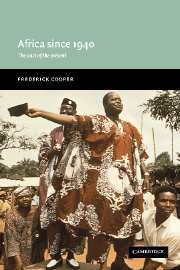Book contents
- Frontmatter
- Contents
- List of plates
- List of figures
- List of maps
- List of tables
- Preface
- Map 1 Africa: countries and cities, c. 2000
- 1 Introduction: from colonies to Third World
- 2 Workers, peasants, and the crisis of colonialism
- 3 Citizenship, self-government, and development: the possibilities of the post-war moment
- 4 Ending empire and imagining the future
- Interlude: rhythms of change in the post-war world
- 5 Development and disappointment: social and economic change in an unequal world, 1945–2000
- 6 The late decolonizations: southern Africa 1975, 1979, 1994
- 7 The recurrent crises of the gatekeeper state
- 8 Africa at the century's turn: South Africa, Rwanda, and beyond
- Index
- References
6 - The late decolonizations: southern Africa 1975, 1979, 1994
- Frontmatter
- Contents
- List of plates
- List of figures
- List of maps
- List of tables
- Preface
- Map 1 Africa: countries and cities, c. 2000
- 1 Introduction: from colonies to Third World
- 2 Workers, peasants, and the crisis of colonialism
- 3 Citizenship, self-government, and development: the possibilities of the post-war moment
- 4 Ending empire and imagining the future
- Interlude: rhythms of change in the post-war world
- 5 Development and disappointment: social and economic change in an unequal world, 1945–2000
- 6 The late decolonizations: southern Africa 1975, 1979, 1994
- 7 The recurrent crises of the gatekeeper state
- 8 Africa at the century's turn: South Africa, Rwanda, and beyond
- Index
- References
Summary
The most important holdouts against the abdication of imperial power in the 1950s and 1960s were colonies with substantial white settlement. But despite the sustained efforts of settlers in Rhodesia and South Africa to retain power and the determination of the Portuguese government to retain colonies, their ultimate fate was determined by the regional and world-wide process which rendered empire indefensible. Take Rhodesia. In order to maintain white rule, Rhodesian settlers gave up their place in an empire that was intent on devolving power to black majorities. The unilateral declaration of independence in 1965 kept in place colonial institutions – a bureaucracy and police apparatus that enforced white landownership and racial segregation – but cut them off from imperial power. When African political movements, well aware of the rights Africans now had elsewhere, turned to guerilla warfare, the state fought back, but it faced a regional problem – armed groups finding sanctuary in now-free neighboring territories – and a global one, economic boycotts and isolation. In the end, colonialism could not be maintained without imperialism, not least because white Rhodesians vitally depended on their sense of participation in “European civilization” and in the comforts, securities, and opportunities of a worldly bourgeoisie. However divided and uncertain the guerilla movement, it won the international battle to be identified with self-determination and progress.
- Type
- Chapter
- Information
- Africa since 1940The Past of the Present, pp. 133 - 155Publisher: Cambridge University PressPrint publication year: 2002



